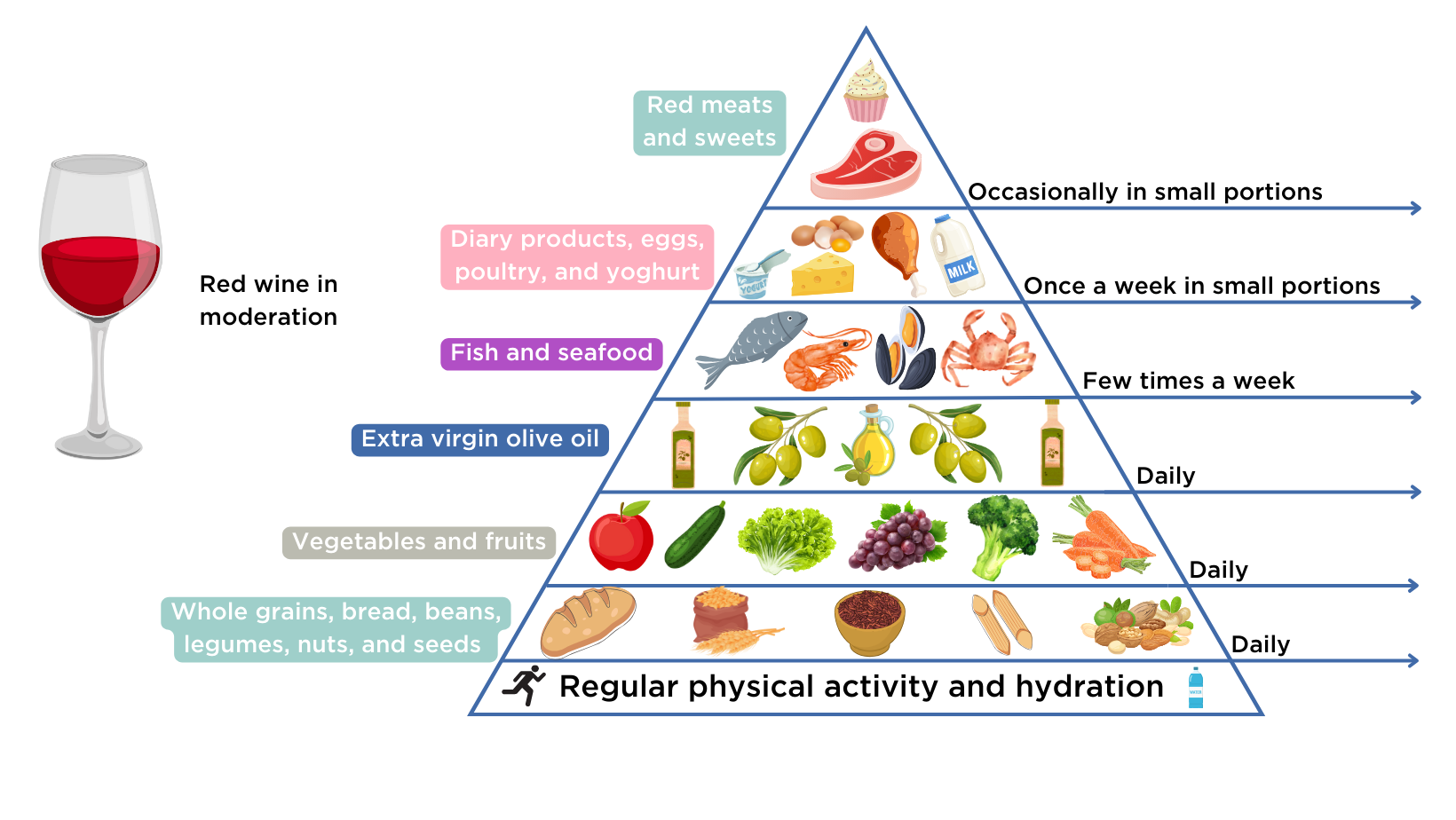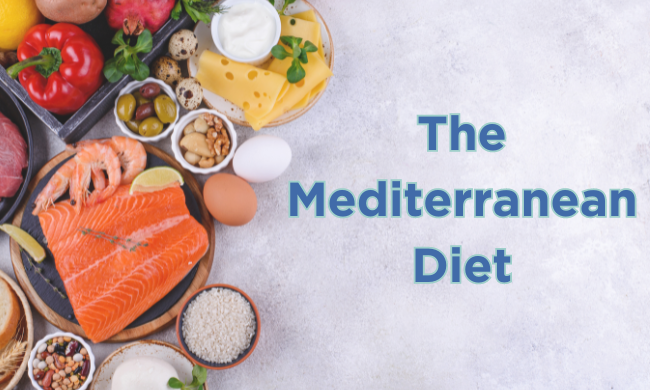The Mediterranean diet is one of the most studied and well-known diets worldwide. The origins of this diet are found in countries surrounding the Mediterranean Sea, in particular Greece and southern Italy (1). The diet has been associated with low rates of chronic diseases and a high life expectancy in these countries. The traditional Mediterranean diet involves:
- High intake of plant foods such as fruits, vegetables, breads, potatoes, beans, nuts, and seeds.
- Minimally processed, fresh, and locally grown foods.
- High intake of olive oil (especially virgin and extra-virgin olive oil) as the principal source of healthy fat.
- Moderate intake of fermented dairy products, mostly cheese and yogurt.
- Fish and white meat are consumed in moderate amounts, and red meat is consumed in low amounts.
- Moderate intake of wine, particularly red wine during meals (1).
The high intake of nuts, and olive oil, and a moderate intake of wine make this diet unique and different from other healthy diets. Still, it can be considered a primarily plant-based diet with healthy fats.
The Mediterranean Lifestyle (MEDLIFE) Index is a questionnaire with 28 questions based on food consumption, dietary habits, exercise, rest, social habits, and friendliness. Each question is assigned points, and the MEDLIFE Index can provide a score that determine overall lifestyle habits (2). A dietitian can help modify the Mediterranean diet based on medical history, underlying conditions, allergies, and preferences (3).
What are the benefits of a Mediterranean diet?
The Mediterranean diet has many benefits, including:
- Lowering your risk of cardiovascular disease (4).
- Supporting a healthy body weight (5).
- Lowering your risk of metabolic syndrome (6).
- Supporting a healthy balance in the gut microbiome (7).
- Lowering the risk of certain cancers (8).
- Helping you live longer (9).
Our diet plays a key role in the regulation of gut microbiota and is an important factor in keeping the microbiome balanced. The gut microbiome is a diverse community of microbes that inhabit our intestines. The microbiome is shaped by biological, genetic, and environmental factors, and has many roles in both health and disease.
Multiple studies investigating the link between our diet and the gut microbiome have shown that diets rich in fat, red meat, and carbohydrates can affect the immune system. Diets low in fish, plant-based foods, and fruit can cause dysbiosis, an imbalance in the gut microbiome (7). The Mediterranean diet is the opposite of this, meaning it supports a healthy balance of microbes in the gut.
A large part of this diet is extra virgin olive oil. Oleic acid is the main fatty acid present in olive oil and has a high antioxidant activity. It inhibits fatty acid biosynthesis and the synthesis of cholesterol, resulting in lower and therefore healthier levels of cholesterol seen in the blood (7).
Dietary fiber has a great prebiotic effect on the microbial growth in the gut. The Mediterranean diet provides double the amount of fiber in the Western diet. The consumption of high fiber can decrease cholesterol and insulin levels in the blood and improve gut microbiome composition (10).
Remember – everyone’s gut microbiome is different, and therefore diets can affect us all differently. You should discuss with your healthcare professional if you are making big changes to your diet.
The Mediterranean diet also:
- Limits saturated fat and trans-fat – eating too much saturated fat can raise your ‘bad’ cholesterol, known as LDL cholesterol. A high LDL cholesterol can increase your risk of plaque build-up in your arteries, which can lead to heart attacks or a stroke. Both saturated and trans-fat can cause inflammation (11).
- Limits sodium – a diet high in sodium can raise your blood pressure, putting you at greater risk for a heart attack or stroke (12).
- Limits refined carbohydrates, including sugar – foods high in refined carbohydrates can cause your blood sugar to spike, as well as giving you excess calories without nutritional benefit (13).

How can OMED Health help?
At OMED Health, we recognize that it is important for individuals to gain insight into the health of their gut microbiome and have an accessible way of monitoring what is going on inside their bodies. We have developed the OMED Health Breath Analyzer and App, set to launch this year.
Once you purchase the device, you can begin using it at home to measure hydrogen and methane levels in your breath. The OMED Health app allows you to log symptoms and track lifestyle factors such as diet, stress, and exercise, helping you identify patterns and potential triggers that may be affecting your gut.
By joining an OMED Health Plan, you gain access to a clinically supported pathway. Our in-house doctor can use your breath test results and symptom data to help diagnose conditions like SIBO or IMO. From there, we guide you through tailored treatment and continue to monitor your breath data to track how your body is responding.
This science-led approach helps you make informed decisions about your gut health with professional support every step of the way. Be among the first to access this powerful tool. Purchase the OMED Health Breath Analyzer and start your journey today.
References.
- Guasch-Ferré M, Willett WC. The Mediterranean diet and health: a comprehensive overview. J Intern Med. 2021;290(3):549–66. DOI: 10.1111/joim.13333
- Sotos-Prieto M, Moreno-Franco B, Ordovás JM, León M, Casasnovas JA, Peñalvo JL. Design and development of an instrument to measure overall lifestyle habits for epidemiological research: the Mediterranean Lifestyle (MEDLIFE) index. Public Health Nutr. 2015 Apr;18(6):959–67. DOI: 10.1017/S1368980014001360
- Cleveland Clinic [Internet]. [cited 2024 Jan 16]. Mediterranean Diet. Available from: https://my.clevelandclinic.org/health/articles/16037-mediterranean-diet
- Sotos-Prieto M, Bhupathiraju SN, Mattei J, Fung TT, Li Y, Pan A, et al. Changes in Diet Quality Scores and Risk of Cardiovascular Disease Among US Men and Women. Circulation. 2015 Dec 8;132(23):2212–9. DOI: 10.1161/CIRCULATIONAHA.115.017158
- Romaguera D, Norat T, Vergnaud AC, Mouw T, May AM, Agudo A, et al. Mediterranean dietary patterns and prospective weight change in participants of the EPIC-PANACEA project123. Am J Clin Nutr. 2010 Oct 1;92(4):912–21. DOI: 10.3945/ajcn.2010.29482
- Godos J, Zappalà G, Bernardini S, Giambini I, Bes-Rastrollo M, Martinez-Gonzalez M. Adherence to the Mediterranean diet is inversely associated with metabolic syndrome occurrence: a meta-analysis of observational studies. Int J Food Sci Nutr. 2017 Feb 17;68(2):138–48. DOI: 10.1080/09637486.2016.1221900
- Merra G, Noce A, Marrone G, Cintoni M, Tarsitano MG, Capacci A, et al. Influence of Mediterranean Diet on Human Gut Microbiota. Nutrients. 2021 Jan;13(1):7. DOI: 10.3390/nu13010007
- Morze J, Danielewicz A, Przybyłowicz K, Zeng H, Hoffmann G, Schwingshackl L. An updated systematic review and meta-analysis on adherence to Mediterranean diet and risk of cancer. Eur J Nutr. 2021 Apr 1;60(3):1561–86. DOI: 10.1007/s00394-020-02346-6
- Trichopoulou A, Kouris-Blazos A, Wahlqvist ML, Gnardellis C, Lagiou P, Polychronopoulos E, et al. Diet and overall survival in elderly people. BMJ. 1995 Dec 2;311(7018):1457–60. DOI: 10.1136/bmj.311.7018.1457
- Di Renzo L, Carraro A, Valente R, Iacopino L, Colica C, De Lorenzo A. Intake of Red Wine in Different Meals Modulates Oxidized LDL Level, Oxidative and Inflammatory Gene Expression in Healthy People: A Randomized Crossover Trial. Oxid Med Cell Longev. 2014 Apr 30;2014:e681318. DOI: 10.1155/2014/681318
- Hooper L, Martin N, Jimoh OF, Kirk C, Foster E, Abdelhamid AS. Reduction in saturated fat intake for cardiovascular disease. Cochrane Database Syst Rev. 2020 May 19;2020(5): CD011737. DOI: 10.1002/14651858.CD011737.pub2
- Suckling RJ, Swift PA. The health impacts of dietary sodium and a low-salt diet. Clin Med. 2015 Dec 1;15(6):585–8. DOI:10.7861/clinmedicine.15-6-585
- Ludwig DS, Hu FB, Tappy L, Brand-Miller J. Dietary carbohydrates: role of quality and quantity in chronic disease. BMJ. 2018 Jun 13;361:k2340. DOI: 10.1136/bmj.k2340




